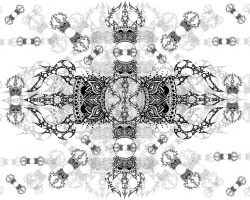Manual of Pramana - Reading Six: Negative and Positive
Selection from the collected topics:
Negative and Positive
The selection here is from a monastic textbook popularly known as The Collected Topics of the Spiritual Son (Sras bsdus-grva), by Master Ngawang Trashi, the spiritual son of the great Jamyang Shepa (1648-1721). Please note that indented statements are usually those given by the opponent. Responses within brackets are those that are usually left unwritten in the Tibetan text, and are understood to be there because of the context following each.
_______________
Here next is a presentation on the concepts of negative and positive. We will first refute the position of our opponents, then present our own position, and then finally eliminate their rebuttal.
Suppose someone comes and makes the following claim:
Anything which is a working thing must always be something positive.
Consider the fact that sound is not unchanging.
So is it then something positive?
Because it is a working thing.
[It doesn't necessarily follow.]
But you already agreed that it does necessarily follow.
[Then I agree to your original statement: the fact that sound is not unchanging is something positive.]
Suppose you agree to our original statement.
Consider the fact that sound is not unchanging.
It is not so, that it is something positive,
Because it is something negative.
[It's not correct to say that the fact that sound is not unchanging is something negative.]
It is so,
Because (1) it is a thing which must be perceived by the state of mind that perceives it directly through the process of eliminating, directly, the thing that it denies; and (2) it is a thing which must be expressed through a process where the wording used to express it does so through a process of eliminating, directly, the thing that it denies.
[The second part of your last statement is not correct: the fact that sound is not unchanging is not a thing which must be expressed through a process where the actual wording used to express it does so through a process of eliminating, directly, the thing that it denies.]
The second part of our last statement is so true, Because the expression “sound is not unchanging” is one where the fact that sound is not unchanging is expressed through eliminating, directly, the idea that sound is something unchanging—by saying so explicitly.
_______________
Suppose someone comes and makes the following claim:
Whenever the actual name for something incorporates a word for the absence of something, then the thing is always a negative thing in the sense of being the absence of something.
Consider the Buddha known as “Limitless Life” (Amitayus).
So is he [a negative thing in the sense of being the absence of something]? Because he is [something where his actual name incorporates a word for the absence of something].
[It doesn't necessarily follow.]
But you already agreed that it does necessarily follow.
[It's not correct to say that the Buddha known as "Limitless Life" is something where his actual name incorporates a word for the absence of something.]
Suppose you say that it’s not correct.
Consider the Buddha known as “Limitless Life.”
He is so [something where his actual name incorporates a word for the absence of something],
Because (1) the term “the Buddha known as ‘Limitless Life’” is his actual name, and (2) the fact that his name incorporates a word for the absence of something is an example of the obvious level of reality.
[I agree to your original statement: the Buddha known as "Limitless Life" is a negative thing in the sense of being the absence of something.]
Suppose you agree to our original statement.
Consider the Buddha known as “Limitless Life.”
It is not so, that he is a negative thing in the sense of being the absence of something,
Because he is a working thing.
[It doesn't necessarily follow.]
Suppose you say that it doesn’t necessarily follow.
It does so necessarily follow,
Because anything which is a negative thing in the sense of being the absence of something is always an unchanging thing.
_______________
Suppose someone comes and makes the following claim:
Anything which is a negative thing is always a thing which has a termof negation incorporated into its actual name.
Consider space.
So is it then a thing which has a termof negation incorporated into its actual name?
Because it is a negative thing.
[It doesn't necessarily follow.]
But you already agreed that it does necessarily follow.
[It's not correct to say that space is a negative thing.]
Suppose you say that it’s not correct.
Consider space.
It is so a negative thing,
Because it is a negative thing in the sense of being the absence of something. [It's not correct to say that space is a negative thing in the sense of being the absence of something.]
Suppose you say it’s not correct.
Consider space.
It is so a negative thing in the sense of being the absence of something, Because, by being the simple elimination of all obstruction, it is a negative thing in the sense of being the absence of something.
[It's not correct to say that space, by being the simple elimination of all obstruction, it is a negative thing in the sense of being the absence of something.]
Suppose you say that it’s not correct.
It is so,
Because it is that space which is an unproduced thing.
[I agree to your original statement: space is a thing which has a term of negation incorporated into its actual name.]
Suppose you agree to our original statement.
Consider space.
It is not so a thing which has a termof negation incorporated into its actual name,
Because there is no term of negation that forms a part of its actual name.
[It's not correct to say that there is no termof negation that forms a part of the actual name of "space."]
Suppose you say that it’s not correct.
Consider space.
It is so true, that there is no termof negation that forms a part of its actual name,
Because (1) the expression “space” (nam-ka) is its actual name, and (2) neither of the two parts of this expression, nam or ka, is a termof negation.
We can also make this point another way.
Consider the nature of things.
So is this then a thing where its actual name incorporates a term of negation?
Because it is a negative thing.
[It doesn't necessarily follow.]
But you already agreed that it does necessarily follow.
[It's not correct to say that the nature of things is a negative thing.] It is correct,
Because the nature of things is a negative thing in the sense of being the absence of something.
[I agree with your original statement: the nature of things is a thing where its actual name incorporates a term of negation.]
But you can’t agree with our original statement,
Because—even though it is a thing where its actual name incorporates no term of negation—the nature of things is a thing which must be perceived by the state of mind that perceives it directly through the process of eliminating, directly, the thing that it denies.
[It doesn't necessarily follow.]
But it does necessarily follow,
Because anything which a thing which must be perceived by the state of mind that perceives it directly through the process of eliminating, directly, the thing that it denies is always a negative thing.
Suppose that, on this point, someone comes and makes the following claim:
Consider physical things.
Are they then negative things?
Because they are things which must be perceived by the state of mind that perceives them directly through the process of eliminating, directly, the thing that they deny.
Suppose you say that it’s not correct [to say that physical things are things which must be perceived by the state of mind that perceives themdirectly through the process of eliminating, directly, the thing that they deny].
Consider physical things.
They are so such things,
Because they are things which must be perceived by the conceptualization which perceives themdirectly through the process of eliminating, directly, the thing that they deny.
Suppose you say that it’s not correct [to say that physical things are things which must be perceived by the conceptualization which perceives themdirectly through the process of eliminating, directly, the thing that they deny].
Consider physical things.
They are so such things,
Because they are things which must be perceived by the conceptualization which perceives themdirectly through the process of eliminating, directly, all that they are not.
To this last we answer, “It doesn’t necessarily follow.”
And suppose you said that it wasn’t correct [to say that physical things are things which must be perceived by the conceptualization which perceives themdirectly through the process of eliminating, directly, all that they are not].
Consider physical things.
They are so things which must be perceived through the process of eliminating, directly, all that they are not,
Because they can be established as existing.
_______________
Suppose someone comes and makes the following claim:
Consider a water pitcher.
It is not so true, that it is something positive,
Because it is something negative.
Suppose you say that it’s not correct [to say that a water pitcher is something negative].
Consider a water pitcher.
It is so something negative,
Because it is a thing which must be perceived by the conceptualization which perceives it directly through the process of eliminating, directly, all that it is not.
To this we answer, “It doesn’t necessarily follow.”
And suppose you say that it’s not correct [to say that a water pitcher is a thing which must be perceived by the conceptualization which perceives it directly through the process of eliminating, directly, all that it is not].
Consider a water pitcher. It is so a thing which must be perceived by the conceptualization which perceives it directly through the process of eliminating, directly, all that it is not,
Because it is something which can be established as existing.
And suppose you did agree to that original statement [that a water pitcher is something negative].
Consider a water pitcher.
It is not so true, that it is a negative thing,
Because it is a positive thing.
[It's not correct to say that a water pitcher is a positive thing.]
Consider a water pitcher.
It is so a positive thing,
Because it is one and the same as a water pitcher.
_______________
Suppose someone comes and makes the following claim:
If something is a negative in the sense of not being something, then it is always a thing where the termwhich expresses it directly implies something else—either a negative in the same sense or a positive—incidental to denying what it denies.
Consider the fact that John Smith, who is chubby, never eats during the day.
So is it then [a thing where the termwhich expresses it directly implies something else—either a negative in the sense of not being something, or a positive—incidental to denying what it denies]?
Because it is [something negative in the sense of not being something].
[It doesn't necessarily follow.]
But you already agreed that it does necessarily follow.
[It's not correct to say that the fact that John Smith, who is chubby, never eats during the day is something negative in the sense of not being something.]
Suppose you say that it’s not correct.
Consider the fact that John Smith, who is chubby, never eats during the day. It is so a negative in the sense of not being something, because it is a thing where the term which expresses it implies something else—either a negative in the sense of not being something, or a positive—incidental to denying what it denies directly in the actual wording.
[It's not correct to say that the fact that John Smith, who is chubby, never eats during the day is a thing where the termwhich expresses it implies something else—either a negative in the sense of not being something, or a positive—incidental to denying what it denies.]
It is so,
Because (1) the termwhich expresses it directly denies that he eats during the day, and implies indirectly that he eats at night; and (2) the fact that he eats at night is something positive.
[I agree to your original statement: The fact that John Smith, who is chubby, never eats during the day is a thing where the term which expresses it directly implies something else—either a negative in the sense of not being something, or a positive—incidental to denying what it denies directly in the actual wording.]
You can’t agree to our original statement,
Because even though the expression “John Smith, who is chubby, never eats during the day” does not directly imply something else—either a negative in the sense of not being something, or a positive—incidental to denying what it denies, it nonetheless does do so indirectly. [It's incorrect to say that, even though the expression "John Smith, who is chubby, never eats during the day" does not directly imply something else—either a negative in the sense of not being something, or a positive—incidental to denying what it denies, it nonetheless does do so indirectly.]
It is so,
Because the expression “John Smith, who is chubby, never eats during the day” directly denies that he eats during the day, and indirectly implies that he eats at night.
On this point, someone may come and make the following claim: It is not so, that the expression “John Smith, who is chubby, never eats during the day” indirectly implies something else—either a negative in the sense of not being something, or a positive—incidental to denying what it denies directly in the actual wording,
Because it is not true that the expression “The Brahmin drinks no alcohol” indirectly implies something else—either a negative in the sense of not being something, or a positive—incidental to denying what it denies directly in the actual wording.
Our answer to this is, “It doesn’t necessarily follow.”
And it is correct to say that it is correct [to say that the expression "The Brahmin drinks no alcohol" indirectly implies something else—either a negative in the sense of not being something, or a positive—incidental to denying what it denies directly in the actual wording],
Because the expression “The Brahmin drinks no alcohol” neither indirectly nor directly implies something else—neither a negative in the sense of not being something, nor a positive—incidental to denying what it denies directly in the actual wording.
And this is so,
Because the expression “The Brahmin drinks no alcohol” implies nothing else—neither a negative in the sense of not being something, nor a positive—incidental to denying what it denies directly in the actual wording.
And this is so,
Because the expression “The Brahmin drinks no alcohol” must be considered a negative thing in the sense of an absence of something.
_______________
Suppose someone comes and makes the following claim:
If something is a negative thing in the sense of not being something, then it is always such that the term which expresses it implies something else—either a negative in the sense of not being something, or a positive—incidental to denying what it denies directly in the actual wording.
Consider an unchanging thing.
So is it then [always such that the term which expresses it implies something else—either a negative in the sense of not being something, or a positive—incidental to denying what it denies directly in the actual wording]?
Because it is [a negative thing in the sense of not being something].
[It doesn't necessarily follow.]
But you already agreed that it does necessarily follow.
[It's not correct to say that an unchanging thing is a negative thing in the sense of not being something.]
Suppose you say that it’s not correct.
Consider an unchanging thing.
It is so a negative thing in the sense of not being something,
Because (1) it is a negative thing, and (2) it is not a negative thing in the sense of being the absence of something.
[The first part of your reason is not correct: it is not correct to say that an unchanging thing is a negative thing.]
Suppose you say that the first part of our reason is not correct.
Consider an unchanging thing.
It is so a negative thing,
Because it is unchanging.
[It's not necessarily the case that something is unchanging just because it is a negative thing.]
Suppose you say that it’s not necessarily the case.
It is so necessarily the case,
Because there is no such thing as a discrete object which is a positive thing and still unchanging.
[It's not correct to say that there is no such thing as a discrete object which is a positive thing and still unchanging.]
It is so,
Because anything that is a discrete object which is a positive thing must always be a working thing.
[I agree with the original statement above: an unchanging thing is always such that the term which expresses it implies something else—either a negative in the sense of not being something, or a positive—incidental to denying what it denies directly in the actual wording.]
You can’t agree with the original statement above,
Because even though an unchanging thing is such that the termwhich expresses it implies something else—either a negative in the sense of not being something, or a positive—it is not something that does so incidental to denying what it denies directly in the actual wording.
[It's not correct to say that, even though an unchanging thing is such that the term which expresses it implies something else—either a negative in the sense of not being something, or a positive—it is not something that does so incidental to denying what it denies directly in the actual wording.]
It is so,
Because [in the Tibetan) the expression “unchanging” [takpa] does not incorporate a negative term.
_______________
Suppose someone comes and makes the following claim:
Anything which is such that the termwhich expresses it implies something else—either a negative in the sense of not being something, or a positive—must always be a negative thing.
Consider a thing which is made.
So is it then a negative thing?
Because it is such that the term which expresses it implies something else—either a negative in the sense of not being something, or a positive.
[It doesn't necessarily follow.]
But you already agreed that it does follow.
[It's not correct to say that a thing which is made is such that the term which expresses it implies something else—either a negative in the sense of not being something, or a positive].
Suppose you say it’s not correct.
Consider a thing which is made.
It is so such that the term which expresses it implies something else—either a negative in the sense of not being something, or a positive,
Because the termwhich expresses it implies that it had causes and conditions.
[I agree to your original statement: a thing which is made is a negative thing.]
Suppose you agree to our original statement.
Consider a thing which is made.
It is not so, that it is a negative thing,
Because it is a positive thing.
[It's not correct to say that a thing which is made is a positive thing.]
Suppose you say that it’s not correct.
A thing which is made is so a positive thing,
Because working things are positive things, and the two are similar cases.
_______________
Suppose someone comes and makes the following claim:
Consider a thing which is made.
It is not so, that it is a positive thing,
Because it’s a negative thing.
Suppose you say that it’s not correct [that a thing which is made is a negative thing].
A thing which is made is so a negative thing,
Because the fact that sound is something which is made is a negative thing.
And suppose you say that it’s not correct [to say that the fact that sound is something which is made is a negative thing].
It is so,
Because the expression “sound is something which is made” is a thing which must be expressed in such a way that eliminates the possibility that sound could not be something which is made.
Our answer to this is, “It doesn’t necessarily follow” [that, because the expression "sound is something which is made" is a thing which must be expressed in such a way that eliminates the possibility that sound could not be something which is made, then the fact that sound is something which is made must be a negative thing].
Well then, according to you physical things must be negative things,
Because physical things are things such that the expression “physical things” must be expressed in such a way that eliminates everything which is not a physical thing.
[I agree physical things must be negative things.]
Suppose you agree.
So are there then no positive things at all?
Because physical things are not positive things.
[I agree that there are no positive things at all.]
Suppose you agree.
So is it then the case that anything which can be established as existing is always something negative?
Because there exist no positive things.
You already agreed to what we just stated as our reason.
And you cannot agree to our first statement, [that anything which can be established as existing is always something negative].
_______________
Suppose someone comes and makes the following claim:
It’s not true of physical things that they are things such that the expression “physical things” must be expressed in such a way that eliminates everything which is not a physical thing.
They are so,
Because it is true of physical things that they are things such that the expression “physical things” must be expressed in such a way that excludes everything which is not a physical thing.
[It's not correct that physical things are such that the expression "physical things" must be expressed in such a way that excludes everything which is not a physical thing.]
It is so,
Because the expression “physical things” applies to physical things in an exclusive way.
And this is necessarily so,
Because the words “in an exclusive way” in the expression “apply to something in an exclusive way” mean that one must rely on excluding all that the particular thing is not.
_______________
Here secondly is the presentation of our own position. There does exist a definition of a negative thing, because it is the following:
A thing which must be perceived by the state of mind which perceives it directly through a process of eliminating, directly, that which it denies.
The four terms “negative thing,” “exclusion,” “exclusion of all other,” and “reversal” all refer to the same thing.
Negative things may be divided into two different types: things that are negative in the sense of not being something, and things that are negative in the sense of the absence of something.
There does exist a definition for a “negative thing in the sense of not being something,” because it is the following:
A negative thing such that the termwhich expresses it implies something else—either a negative in the sense of not being something, or a positive—incidental to denying what it denies.
There does exist a classic example of a negative thing in the sense of not being something, for it is “sounds are [always] changing things.”
There does exist a definition for a negative thing in the sense of being an absence of something, for it is the following:
A negative thing such that the termwhich expresses it does not imply something else—either a negative in the sense of not being something, or a positive—incidental to denying what it denies.
There does exist a classical example of a negative thing in the sense of being an absence of something, for it is the fact that no person has any nature of their own.
Negative things may be divided into five different types:
1) Those which are such that the termwhich expresses themdirectly implies something else—either a negative in the sense of not being something, or a positive—incidental to denying what it denies directly in the actual wording;
2) Those where the termwhich expresses themdoes this implying indirectly;
3) Those where the termwhich expresses themdoes this implying both directly and indirectly;
4) Those where the termwhich expresses themdoes this implying by context;
5) Those which are such that the termwhich expresses themim plies nothing else—neither a negative in the sense of not being something, nor a positive—incidental to denying what it denies directly in the actual wording.
There does exist the first type, the kind which are such that the termwhich expresses them directly implies something else—either a negative in the sense of not being something, or a positive—incidental to denying what it denies directly in the actual wording, because one would be the fact that the fact that no person has any nature of their own is true of a water pitcher.
Suppose you say that this is not correct.
Consider this same thing.
It is so true that it is the kind of negative thing which is such that the term which expresses it directly implies something else—either a negative in the sense of not being something, or a positive—incidental to denying what it denies directly in the actual wording,
Because (1) the termwhich expresses it denies what it denies directly in the actual wording; and (2) it also directly implies something else—either a negative in the sense of not being something, or a positive.
[The first part of the reason you gave is incorrect: it is not correct to say that the termwhich expresses the fact that the fact that no person has any nature of their own is true of a water pitcher denies what it denies directly in the actual wording.]
But the first part of our reason is correct,
Because the expression “the fact that the fact that no person has any nature of their own is true of a water pitcher” denies, in its actual wording, the possibility that any nature of their own that belonged to some person could ever be true of a water pitcher.
[The second part of the reason you gave is incorrect: it is not correct to say that the termwhich expresses the fact that the fact that no person has any nature of their own is true of a water pitcher also directly implies something else—either a negative in the sense of not being something, or a positive.]
But the second part of our reason is correct,
Because the expression “the fact that the fact that no person has any nature of their own is true of a water pitcher” (1) directly implies that the fact that nvo person has any nature of their own exists, and (2) the fact that the fact that no person has any nature of their own is true of a water pitcher is a negative thing in the sense of not being something. The first part of our reason is easy to accept.
Suppose you say that the second part is not correct.
Consider the fact that no person has any nature of their own.
The fact that it is true of a water pitcher is so a negative thing in the sense of not being something,
Because it can be established as existing.
There does exist the second type of negative, the kind which are such that the termwhich expresses themindirectly implies something else—either a negative in the sense of not being something, or a positive—incidental to denying what it denies directly in the actual wording, because one would be the fact that John Smith, who is chubby, never eats during the day.
[It's not correct to say that the fact that John Smith, who is chubby, never eats during the day is an example of this kind of negative.]
It is so,
Because (1) the expression “John Smith, who is chubby, never eats during the day” indirectly implies that he eats at night, incidental to denying directly what it denies: that he eats during the day; and (2) his eating at night is a positive thing.
It is so,
Because eating is a positive thing.
There does exist the third type of negative, the kind which are such that the termwhich expresses themboth directly and indirectly implies something else—either a negative in the sense of not being something, or a positive—incidental to denying what it denies directly in the actual wording, because one would be the fact that there exists a John Smith who is chubby, who doesn’t eat during the day, and who is not thin.
[It's not correct to say that the fact that there exists a John Smith who is chubby, who doesn't eat during the day, and who is not thin, is the kind of negative thing such that the termwhich expresses it both directly and indirectly implies something else—either a negative in the sense of not being something, or a positive—incidental to denying what it denies directly in the actual wording.]
It is so correct to say just this,
Because (1) the expression “There exists a John Smith who is chubby, who doesn’t eat during the day, and who has a body that is not a thin one,” indirectly implies that he eats at night—and directly implies that there is a body which is not thin—incidental to denying directly that he eats during the day; and (2) the fact that there is a body which is not thin is a negative in the sense of not being something.
There does exist the fourth type of negative, the kind which is such that the term which expresses it implies through the context something else—either a negative in the sense of not being something, or a positive—incidental to denying what it denies directly in the actual wording, because one would be where you had determined that a particular person must be either of the royal caste or the Brahmin caste, but were unsure of which; and then someone says “They are not a Brahmin.” The actual wording here directly denies, in its actual wording, that they are a Brahmin, and then implies—through the context—that they are of the royal caste; and this is the process you have to go through to determine which they are.
There does exist finally that kind of negative where the termwhich expresses it implies nothing else—neither a negative in the sense of not being something, nor a positive—incidental to denying what it denies directly in the actual wording, because one would be the fact that a certain Brahmin does not drink alcohol.
[It's not correct to say that the fact that a certain Brahmin does not drink alcohol is a kind of negative where the termwhich expresses it implies nothing else—neither a negative in the sense of not being something, nor a positive—incidental to denying what it denies directly in the actual wording.]
It is so,
Because the expression “The Brahmin does not drink alcohol” implies neither directly, nor indirectly, nor by context, anything else—neither a negative in the sense of not being something, nor a positive—incidental to denying what it denies directly in the actual wording: that is, that the Brahmin did drink alcohol.
These five can be grouped into two categories: negatives in the sense of not being something, and negatives in the sense of the absence of something. This is because the first four should be considered negatives in the sense of not being something, and the last should be considered a negative in the sense of the absence of something.
It is not necessarily the case that, just because something is a negative thing, the termwhich expresses it denies what it denies in the actual wording. This is because this is neither necessarily the case with negatives in the sense of not being something, nor the case with negatives in the sense of being an absence of something.
[The first part of your reason is not correct: it's not correct to say that it is not necessarily the case with negatives in the sense of not being something that the termwhich expresses themdenies what it denies in the actual wording.]
But the first part of our reason is correct,
Because—even though the two of unchanging things and knowable things are negatives in the sense of not being something—they are not such that the terms which express them [in Tibetan) deny what they deny in the actual wording.
[The second part of your reason is not correct: it's not correct to say that it is not necessarily the case with negatives in the sense of being an absence of something that the term which expresses themdenies what it denies in the actual wording.]
But the second part of our reason is correct,
Because—even though the two of space and the true nature of things are negatives in the sense of being an absence of something—they are not such that the terms which express them deny what they deny in the actual wording.
Logical Statements that Use Natures
The following selection is from the monastic textbook entitled An Explanation of the Art of Reasoning (rTags-rigs), by the Tutor of His Holiness the Dalai Lama, Purbuchok Jampa Tsultrim Gyatso (1825-1901).
_______________
Here secondly is our explanation of correct reasons of the type that use natures. We will proceed in three steps: the definition, the divisions, and the classical examples.
Here is the first. The definition of a correct reason of the type that uses a nature is as follows:
A reason where the three relationships hold, and which utilizes a nature.
The definition of a correct reason of the type that uses a nature in any particular proof is as follows:
A reason where the three relationships hold, and which utilizes a nature, in any particular proof.
The definition of a correct reason of the type that uses a nature in any particular proof can also be defined as follows:
A reason which is (1) a correct reason in any particular proof, and (2) which is established as being this kind of reason [one that uses a nature) by virtue of the fact that anything considered the explicit quality to be proven for the particular proof in which it serves as the reason is necessarily such that to be it [the reason) is to be the quality.
Here is the second step. Correct reasons that utilize a nature can be divided into two different types: correct reasons that utilize a nature and which are such that they depend on a certain distinction, [of suggesting the thing that made it]; and correct reasons that utilize a nature and which are such they are free of dependency on a certain distinction, [of suggesting the thing that made it].
Here is the definition of the first:
A reason which is (1) a correct reason for any particular proof which utilizes a nature; and (2) which is established as being this kind of reason by virtue of the fact that the termwhich expresses it suggests the thing that made it.
The definition of the second is as follows:
A reason which is (1) the same as the first part just given; and (2) which is established as being this kind of reason by virtue of the fact that the termwhich expresses it does not suggest the thing that made it.
The first type may be further divided into two: those which suggest the thing that made them directly, and those which do so indirectly.
Here thirdly are the classical examples. “A thing which is produced by conscious effort” and “a thing which is brought about” are examples of the first type of reason, in a proof that the sound of a ritual horn is a changing thing.
“A thing which is made” is an example of the second type of reason, in a proof that sound is a changing thing. “A working thing” is an example of a correct reason which utilizes a nature and which is such it is free of dependency on a certain distinction, [of suggesting the thing that made it].
A correct reason which utilizes a nature and which is employed in the proof that sound is a changing thing can also be divided in a different way. This division would be into the two of (1) correct reasons which utilize a nature and which apply to the entire group of similar cases for the proof; and (2) correct reasons which utilize a nature and which both apply and fail to apply to the group of similar cases for the proof.
Respective examples would be the reason “a thing which is made,” and the reason “something characteristic of the quality of being made.”
Here is a demonstration for each of these.
“A thing which is made” is the first kind of reason,
Because it is (1) a correct reason for the particular proof which utilizes a nature; and (2) it is such that, if something is a changing thing, it must always be it [that is, a thing which is made].
“Something characteristic of the quality of being made” is the second kind of reason,
Because it is (1) a correct reason for the particular proof which utilizes a nature; and (2) it is such that, if something is a changing thing, it is not necessarily it [that is, something characteristic of the quality of being made].
Using Scriptural Authority
In Buddhist debate, we can prove a thing in two ways: we can prove it with logic, and we can prove it with scriptural authority; that is, by quoting a scripture which is accepted by the opponent. In Tibetan these two are known, respectively, as rikpa (rigs-pa) and lung (lung)—and the idea is so important that some monks (such as Khen Rinpoche’s devoted attendant) are give the name “Lungrik.” Quoting scripture must obviously be used with care when attempting to demonstrate something to a person who is not yet a Buddhist, since they may very well deny the authority you are quoting.
Favorite texts to quote in the monastery are the older scriptures from India: either the word of Lord Buddha himself, or the word of one of the great early Indian masters, as found in the Kangyur and Tengyur collections of the great classics of India translated into Tibetan. These are accepted by all schools of Tibetan Buddhism. In a debate between monasteries which are all of the Gelukpa tradition—such as the annual winter debates attended primarily by monks of the “Great Three” monasteries of Sera, Ganden, and Drepung—the favorite works to cite would be those of Je Tsongkapa or one of his major disciples: Gyaltsab Je, Kedrup Je, or His Holiness the First Dalai Lama.
In everyday debates at your own home monastery, you would normally quote fromone of the monastic textbooks that are unique to the curriculumof each individual monastery; these are known as yikcha (yig-cha). These textbooks have developed over the last five hundred years much in the same way as the ACI course notebooks, and similar courses in the West.
The ammunition for using a quotation in the debate ground must of course be prepared in advance: no one can bring a scrap of paper into the area, and all quotations must be recited from memory. One way to get a good booing from the assembled crowd is to start a quotation and then flounder, unable to finish it from memory!
A scriptural citation is normally used to back up an assertion just given as a reason in a proof, and it is often introduced with a great flourish, emphasizing the indisputability and greatness of the source you have selected. You might see, for example, the following, where we start out with:
Consider sound.
It is a changing thing,
Because it is something which is made.
The opponent replies with:
Your reason is wrong!
Meaning, sound is not a thing which is made. We then reply with,
Consider sound.
It is so something which is made,
Because it was spoken to be that way by the High and Holy One, the Good and Glorious Kedrup Tenpa Dargye, a Master (Ke) Who has Found All Attainments (Drup), and Whose Kindness to All of Us is Infinitely High; and because His words are something that you must accept!
And he did so speak it be this way, because he did so in his Overview of the Perfection of Wisdom, with the following words: “When we use ‘something which is made’ as a reason to prove that sound is a changing thing.”
Kedrup Tenpa Dargye (1493-1568) is the principal author of the textbook series of Sera Mey; he is therefore, for the monks of Sera Mey, an indisputable authority, and his words must be accepted.
A typical strategy once an opponent has resorted to scriptural authority is to respond that, despite the fact that such a statement was once made by that authority, it does not necessarily prove what the opponent claims that it does.
In such a case, the other side in the debate just described might come back with:
“It doesn’t necessarily follow!”
Whenever someone contradicts scripture, it’s time to pull out the unique response used by monks from Sera Mey. (Other monasteries have their own slightly different version.) Here you screamthe following at the top of your lungs, and then go on to the formula above:
You contradict the scriptures! You contradict the holy scriptures!
See also
- Manual of Pramana - Reading One: Why Study the Art of Reasoning?
- Manual of Pramana - Reading Two: An Outline of All Existing Things
- Manual of Pramana - Reading Three: Quality and Characteristic
- Manual of Pramana - Reading Four: Causes and Results
- Manual of Pramana - Reading Six: Negative and Positive
- Manual of Pramana - Reading Seven: Contradiction and Relationship
- Manual of Pramana - Reading Eight: Definitions and the Things They Define
- Manual of Pramana - Reading Nine: The Concept of Exclusion in Perception
- Manual of Pramana - Reading Ten: The Concept of Time
- Manual of Pramana - CLASS NOTES part 1
- Manual of Pramana - CLASS NOTES part 2

































